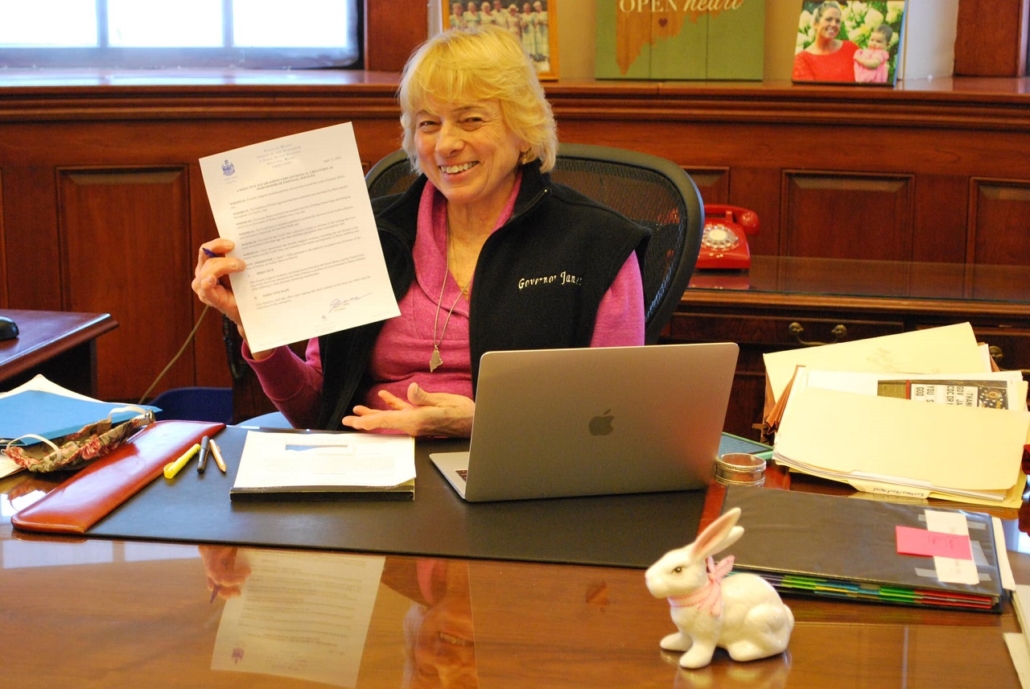JMG gives $300,000 to students for groceries
 As families continue to struggle with the economic impact of COVID-19, Jobs for Maine Graduates is partnering with its school partners to distribute $100 Hannaford Supermarkets gift cards to 3,000 students and their families throughout the state, according to a news release from the organization.
As families continue to struggle with the economic impact of COVID-19, Jobs for Maine Graduates is partnering with its school partners to distribute $100 Hannaford Supermarkets gift cards to 3,000 students and their families throughout the state, according to a news release from the organization.
While Maine’s K-12 public schools continue to provide free bagged breakfasts and lunches to students by scheduling pick up times, and school bus deliveries, food insecurity continues to rise.
“The need is so great right now, and it just keeps increasing. JMG has taken the lead in this effort, and is putting resources directly into the hands of our students and families at a time when they need it the most,” said Eric Haley, superintendent of Waterville Public Schools, according to the release. “This is an example of student-centered, results-driven partnership at its best.”
JMG programs are hosted within Maine’s public schools and higher education systems. Program specialists deliver a competency-based model, providing instruction for essential life and career skills, through personalized learning strategies. The program has named its relationship-based approach a “continuum of support”. It is the only nonprofit in Maine serving students from middle school through high school graduation, and into post-secondary education and careers, according to the release.
There are 143 JMG programs in Maine, in all 16 counties.
“Students in all of the communities we serve have been telling their JMG specialists they are struggling with getting enough food and other critical household items,” said Craig Larrabee, JMG’s President and CEO, according to the release. “JMG serves as a bridge between public education and private business. I reached out to the private sector because I knew its leaders would want to do something to support Maine students. Unum was the first to say yes, and others quickly joined forces.”
“Unum has learned from past investments that JMG specialists have a deep understanding of their students. JMG’s relationship-based network is one of the fastest ways Unum can get relief to our neighbors in need,” said Cary Olson Cartwright, Unum’s assistant vice president of Corporate Social Responsibility.
Bill Williamson, Maine President for Bank of America, said the request from JMG met important standards, “We look for organizations that are really going to have an impact and make a difference, and that is why we contribute to JMG. It has the leadership, the scope of services, and scale needed. JMG is unique because it offers a full spectrum of support, and students know JMG is there for them.”
Eve Pelletier is a student enrolled in JMG’s College Success program at the University of Maine at Fort Kent. Formerly in foster care, Pelletier credits her JMG Specialist Susan Dubay with helping her with everything from applying for a tuition waiver to making sure she had her own laptop when Maine’s university system had to close its campuses and move to a distance learning platform.
“My JMG specialist is basically my go-to person for everything. I just started my first semester at UMFK this January, but my specialist started reaching out to me last August because she knew I was interested in going. She worked with me for months to make sure I was ready and to help me create my financial plan,” said Pelletier. “The coronavirus was a complete surprise, and it was shocking to have to leave campus. Now my JMG specialist is my life-line while I am trying to figure out how to finish classes online.”
“We have physical distance, but our connections to students have never been stronger,” said Susan Dubay, the JMG college success specialist at UMFK. “All of my colleagues, all JMG specialists, are proactively reaching out to our students, providing consistency and comfort, asking students what they need most amid all the disruptions to their lives.”
According to the release, JMG secured private donations from Maine employers; and, the Harold Alfond Foundation agreed to provide matching funds ─ bringing total contributions to $300,000 to help JMG students overcome food insecurity. Corporate donors includes Unum, Bank of America, Hannaford Supermarkets, Procter & Gamble, Bangor Savings Bank, AT&T, Skowhegan Savings Bank, IDEXX, Machias Savings Bank, BerryDunn, E.J.Prescott, Pratt & Whitney, Kennebec Savings Bank, Hospitality Maine, Pike Industries and the Retail Association of Maine.
“We consider JMG to be one of Maine’s anchor organizations making important contributions to the state and economy,” said Greg Powell, chairman of the Alfond foundation. “JMG’s rapid response is helping to meet the needs of students during these challenging times, while also ensuring these funds go directly back into local stores to contribute to Maine’s economy. We are pleased to make this worthy investment.”
All of JMG’s school-based partners will receive a minimum of 20 gift cards for $100 to local Hannaford Supermarkets and/or its affiliate stores. JMG specialists will collaborate with school administrators to distribute the gift cards to 3,000 students and their families this week.
The statewide, private nonprofit partners with public schools and private businesses to offer results-driven solutions to ensure all Maine students graduate, attain post-secondary credentials and pursue meaningful careers. JMG provides more than 11,000 students a year with the skills and experience they will need to reach their potential. JMG graduates become engaged members of their communities, productive adults in the workforce, and contributors to Maine’s economy.









 by Melissa Martin
by Melissa Martin
 The Department of Treasury and Small Business Administration (SBA) has released an interim final rule on the Paycheck Protection Program (PPP). Agricultural producers are eligible to participate in the program and should reach out to their bankers and/or agricultural lenders to apply. While SBA still needs to confirm some administrative details, loans will be provided on a first-come, first-served basis and producers can get started on the application now.
The Department of Treasury and Small Business Administration (SBA) has released an interim final rule on the Paycheck Protection Program (PPP). Agricultural producers are eligible to participate in the program and should reach out to their bankers and/or agricultural lenders to apply. While SBA still needs to confirm some administrative details, loans will be provided on a first-come, first-served basis and producers can get started on the application now.